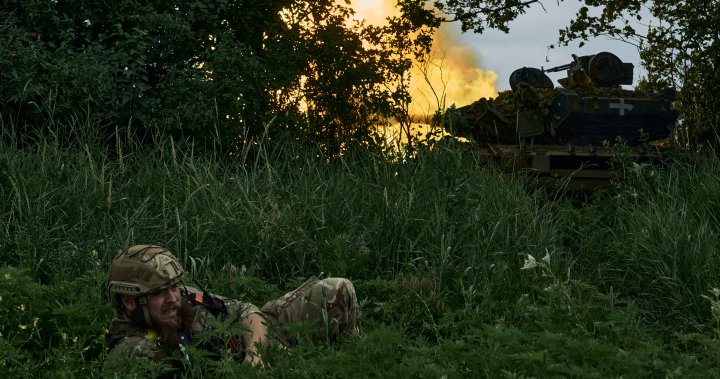Ukraine announced on Monday that Russian forces had been driven out of an eighth village during their recent counteroffensive. This particular settlement, Piatykhatky, is located on a heavily fortified part of the front line near the most direct route to Ukraine’s Azov Sea coast. Initially, a Russian-installed official claimed that Ukraine had taken control of Piatykhatky. However, he later admitted that Moscow had pushed them out, and on Monday morning, he reported that Ukraine was attacking again.
Ukraine’s Deputy Defence Minister, Hanna Maliar, stated that not only had Ukrainian forces retaken Piatykhatky, but they had also made significant advances into Russian lines, capturing 113 square km of land. Maliar shared this information on the messaging app Telegram, referring to two cities on the Russian-occupied coastline, Berdiansk and Melitopol.
The capture of these villages demonstrates Ukraine’s incremental gains as they strive to break through the fortified lines that Russia has spent months strengthening. Piatykhatky is particularly significant as it is located roughly 90 km from the coast.
Ukrainian President Volodymyr Zelenskyy commended the efforts of the troops and expressed his commitment to continue negotiations with Western allies in order to obtain weapons and ammunition supplies as soon as possible. He emphasized the importance of a swift supply chain to support Ukraine’s advancing troops.
In response to Ukraine’s counteroffensive, the Russian Defence Ministry announced that they had successfully thwarted a Ukrainian attempt to seize the village of Novodonetske in the eastern Donetsk region. The ministry released a video purportedly showing a captured French-made tank. Ukrainian authorities did not comment on this claim, and Reuters could not independently verify the latest battlefield accounts.
Ukraine has acknowledged attacks across various sections of the 1,000 km front line. These strikes are part of the anticipated counteroffensive aimed at reclaiming the 18% of Ukrainian territory currently under Russian occupation. Nevertheless, due to security concerns, Kyiv has imposed an information blackout on ongoing and future battles. Analysts suggest that the main phase of the counteroffensive has yet to commence.
Both sides have suffered heavy losses in recent fighting. However, both Russia and Ukraine claim to have lost fewer troops than their opponents. The Russian-installed official, Vladimir Rogov, acknowledged the success of Ukraine’s offensive but highlighted the significant losses incurred by the enemy.
This conflict has taken a severe toll, resulting in the deaths of thousands of civilians, widespread destruction, displacement of millions, and broader global consequences such as inflation and reshaping security dynamics.
Russia justifies its invasion of Ukraine by claiming the need to “denazify” the country, an argument widely dismissed by Ukraine and its Western allies as a pretext for territorial expansion.
In Sweden, which applied to join NATO following Russia’s invasion last year, legislators now view Russia as a long-term threat to European and global security.
While Ukraine conducts probing attacks to assess Russian forces, officials from two NATO member states have reported that Russia is redeploying some of its troops to anticipate Ukraine’s next move. Intelligence officials from the UK and Estonia stated that Russia had been moving forces east along the front line from areas south of the Dnipro River following the destruction of the Kakhovka hydroelectric dam on June 6.
Estonia commented that the Ukrainian forces were approaching the counteroffensive methodically but predicted that an offensive within the next seven days was unlikely.
The recent flooding caused by the destruction of the dam has made any cross-river attack extremely challenging. Analyst Michael Kofman noted that the flooding posed significant obstacles for an operation that would have been risky even under normal circumstances. Ukrainian officials claim that over half of the affected areas lie on the Russian-occupied side of the river. Russia’s Defence Ministry has warned of the potential outbreak of mosquito-borne diseases in the area, such as West Nile Fever.
On the international front, the United Nations offered assistance to help residents affected by the flooding, but Russia declined their help citing security concerns and “other nuances.” The UN’s humanitarian coordinator for Ukraine, Denise Brown, expressed her disappointment, stating that aid should not be denied to those in need.
Denial of responsibility! VigourTimes is an automatic aggregator of Global media. In each content, the hyperlink to the primary source is specified. All trademarks belong to their rightful owners, and all materials to their authors. For any complaint, please reach us at – [email protected]. We will take necessary action within 24 hours.


